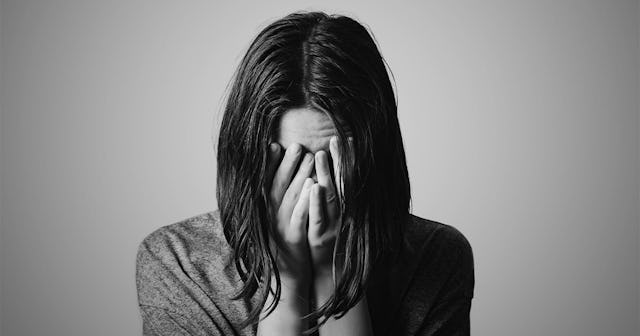This Is The Shame Of Being Secretly Gay

Trigger warning: suicidal ideation
I’m here; I’m queer, but I’m still not used to it. In fact, writing these words makes me anxious. My heart is racing, pounding in my chest. There is a tightness around my breast — vice is gripping me. Squeezing. Tightening. Twisting. I’m struggling for air. And my whole body is warm and flushed. I can feel a panic attack coming on. Deep breath in, deep breath out. But I don’t feel this way because I’m ashamed of who I am. Not really. I’m a proud gay woman, one who acknowledged her sexuality last year, in the midst of a pandemic. In the middle of curfews, quarantines, and a (near) complete shutdown. I feel this way because I am secretly gay, which is to say I still live a very closeted life, and the shame is killing me.
The weight is overwhelming.
To be clear, there are a few people who know about my identity. I’ve confided in my spouse and sister, my best friend and sister-in-law. My therapist knows, as does my psychiatrist. Telling them was (more or less) essential. I couldn’t work through my feelings if I hid them, and two of my dearest companions know about my sexuality. Hell, they’ve helped me come to terms with it. They’ve loved me on the days when I’ve wanted to give up. When I feel broken and damaged. When I feel as though something or someone — ehem, me — is wrong. But otherwise, my secret is just that: a secret. And living in the closet is hard. It is a cold, lonely place.
I regularly have breakdowns and panic attacks. I am anxious, uncomfortable. I feel like I’m crawling in my own skin. Sometimes I drink more than I should. I have an extra glass of wine or two. I throw back another bottle of beer. I worry. A lot. I wonder how my secret identity will affect my loved ones and family. Can I still have this family — the nuclear one I’ve built — if I’m gay? Will I lose their love and companionship? Will I lose my in-laws, “cousins,” and friends? I also fight with age old adages and beliefs. I wrestle with things I was taught during my Catholic upbringing, by the church and in my home because I was supposed to find love and marriage. My life was meant to include long term vows and a (proverbial) baby carriage, and while these things are very much a part of who I am, I don’t know how these things will change when I “come out,” openly and freely. When everyone knows my truth.
Of course, I am not alone. Millions of individuals struggle with their sexuality. In fact, it is estimated that 83% of those who identify as lesbian, gay, or bisexual keep their orientation hidden from all or most of the people in their lives, according to a study by the Yale School of Public Health.
“In the developmental histories of gay men and women, periods of difficulty in acknowledging their homosexuality, either to themselves or to others, are often reported,” an article on the Psychiatric Times reports. “Hiding activities learned in childhood often persist into young adulthood, middle age and even senescence, leading many gay people to conceal important aspects of themselves.” Millions, like me, hide who they are and how they feel. And while their reasoning varies — people stay closeted for numerous different reasons — the effects of such secrecy are similar.
Many closeted individuals will experience and/or live with chronic mental health conditions, including depression and dissocitive identity disorder, an article on Out Smart explains. “Notable psychiatrists Sullivan and Roughton have discovered that closeted individuals routinely separate their attractions and feelings for the persons of the same sex from their identity. That means these men and women find their desires so unacceptable that they keep them out of their conscious awareness, separating their sexual identity from the rest of their persona. Blocking the anxiety-provoking thoughts about their sexuality forces them to lead a double life and are very often unaware of it.” It can also cause feelings of sadness and apathy. Self-loathing and hatred are also common. And some closeted individuals will use and abuse substances. Others will have suicidal thoughts.
“Growing increasingly withdrawn and depressed, closeted individuals often follow unsafe sexual practices and engage in other destructive, risk-taking behavior,” Out Smart explains. “Constantly haunted by suicidal thoughts, many consider ending their lives.”
I have.
It’s been a month since I last considered killing myself.
But, closeted or not, you do not have to accept the shame and blame. You do not have to live with these thoughts. From therapy to LGBTQ support groups, there is hope.
If you or someone you love is struggling with their identity and/or is experiencing suicidal thoughts, visit GLAAD for a full list of resources or contact someone at the The Trevor Project or the LGBT National Helpline.
This article was originally published on